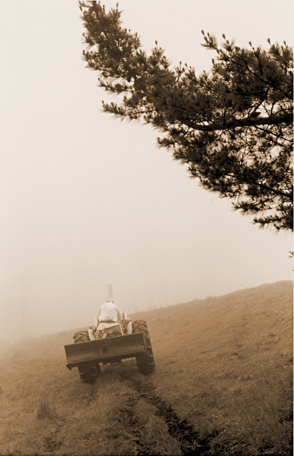The Letter P: The Story of Pulcinella

About the work
‘The Letter P’ is a ride with Pulcinella on a roller coaster of European history, politics, language and culture. At the beginning of the 17th century, the Italian commedia dell'arte introduced the hunchback Pulcinella for the mirth and mockery of its audience. His diasporic tale of ancient Roman curses, Marranism, and escape from fascist Italy to Argentina is recounted for the first time in an interview by the Itallian Radio Network RAI 8. The revelation of Pulcinella’s Judaic roots challenges the benign public image of the commedia dell'arte and casts the shadow of modernism over its not-so-innocent origins.
Pulcinella is the last Marrano, or new Christian, who secretly worships as a Jew. He is not the descendant of Maccus from late Roman theater, nor the Neapolitan of Neapolitans as history has written, nor the Pulcinella of the ghetto tribe Tiepolo has painted, but the other Pulcinella who wears mask upon mask and whose true identity is as a descendant of Jews who emigrated from Spain to Venice via the Kingdom of Naples, only to emerge in the 17th century a favorite of the commedia dell'arte.
Reviews
- “Mill Valley Fest Holds Lead in Shaken and Stirred Media,” Tony Reveaux, Film/Tape World, Vol.10, No.118, Nov. 1997. “Margaret Fisher’s ‘The Letter P, the Story of Pulcinella’ is a sophisticated poetic performance essay which celebrates as it reveals the ancient Judaic roots of that picaresque primal image of commedia dell'arte. Fisher adroitly mixes media with layers of meaning to weave a bittersweet but humanized portrait of this archetypal figure of world entertainment.”
- “Videos,” Renata Polt, Hadassah Magazine, February, 2998. “‘The Letter P. The Story of Pulcinella.’ A complex, partly surreal collage of drama, on-screen printed words and music, this 25-minute video takes off from the conceit that the commedia dell'arte figure of Pulcinella - a hunchbacked, hook-nosed male - was really a secret Jew.”
- “Film,” M. Faust, ArtVoice, June 17-23, 1999. “‘The Letter P’ is a meditation on Pulcinella, the recurring figure from Italian commedia dell'arte whose history is that of European anti-Semitism. It is an ambitiously rich subject, and if half an hour is hardly enough to do it justice, the filmmakers cram that time with references, allusions and information.”
- “The Letter P: The Story of Pulcinella” Abigail Izzo, L'Italo-Americano, June 26, 1997. “This video, which was recently released in Italian with English subtitles, is interesting avant-garde, to say the least. At times I felt I was watching a Federico Fellini film.
Video
Credits
- Written, Directed, Edited by: Margaret Fisher
- Music: Robert Hughes
- Additional Music: Cactus Needle Project
- Camera: Marjorie Franklin, Naoya Hatakeyama, Jerry Carniglia, Margaret Fisher
- Pulcinella: Gwendolyn Harper, Greg Harper, Jay Derringer, Bob Hughes, Julius Webster, Margaret Fisher
- Pierrot: Jerry Carniglia
- Gianni Radio: Gian Carlo Aquilanti
- Pimpanelle: Joyce Lightbody, Nanne Meyer, Denice Newman, Elena Rivera
- Priests: Piermario Vescovo, Tommaso Todesco
- With: Walter Zimmerman, Chryssa Udvardy
- Guitar: Marc Teicholz
- Voice-Over: Shadi Bartsch, Francesco Goretti, Miriam Weisang Misrach
- Art Direction: Jerry Carniglia
- Costumes: Jacqueline Humbert of Avant-Garter
- Puppets: Michael Bush, Margaret Fisher
- Produced by: Second Evening Art and MAFISHCO
- Languages: Italian, Venetian dialect, French, Latin Subtitles: English.
- Release date: 1997
- TRT: 25 minutes.
- Genres: Faux Foreign, Commedia dell'Arte, Experimental Video, Video Short
- Dedication: Carla Pozi Picozzi, director, Teatro L'Avogaria
- Audio CD: The music heard on this video, Trio for Mexican Clay Flute and Music for Geraldine,
is available on audio CD: Second Evening Art AG1964.
Screenings and Awards
- Gold Award, JVC Tokyo Video Festival: Tokyo, Japan
- First Prize, Jewish Video Competition: Berkeley, CA
- Grand Festival Experimental Award, Berkeley Video & Film Festival: Berkeley, CA
- Bronze Award, Worldfest Flagstaff: Flagstaff, AZ
- Runner-Up, Experimental/Music-Video, SONY Visions of USA Festival: Los Angeles, CA
- Jury Award, New York Exposition of short Films & Videos: NYC, NY
- New York International Independent Film & Video Festival: New York, Los Angeles
- Videofest, Mill Valley Film Festival: Mill Valley, CA
- EuroUnderground Tour, 1988: Krakow, Poland; Sofia Bulgaria; Wroclaw, Poland; Berlin, Germany
- Independent Exposure, The Mansion Theater: Baltimore, MD
- Independent Exposure, Artists Television Access (ATA): San Francisco, CA
- Independent Exposure, The Speakeasy Cafe: Seattle, WA
- Independent Exposure, The Knitting Factory: New York, NY
- California College of Arts: Dahl Auditorium
- Judah L. Magnes Museum, Berkeley, CA: continuous screening, Fall 1997
- Jewish Video Competition at the Pacific Film Archive: Berkeley, CA
- The Squeaky Wheel, Buffalo, NY: The Translation and Replication Series
- The Virginia Museum of Fine Arts: Richmond, VA